UK Business Law: An Examination of the Legal System and Solutions
VerifiedAdded on 2024/06/11
|25
|5243
|495
Report
AI Summary
This report provides an analysis of the UK's legal system and its impact on business operations. It explores various sources of law, including legislation, common law, and European law, and examines the role of government in law-making. The report also discusses the potential impact of company, employment, and contract law on businesses, using specific examples such as the duties of directors under the Companies Act 2006, health and safety regulations, equal opportunity regulations, and general data protection regulations. Furthermore, it suggests appropriate legal solutions for a range of business problems, such as termination of contract, rescue from insolvency, and liquidation, while also assessing the positive and negative impacts of these solutions. The report concludes by recommending legal solutions based on alternative legal advice and comparing their effectiveness.
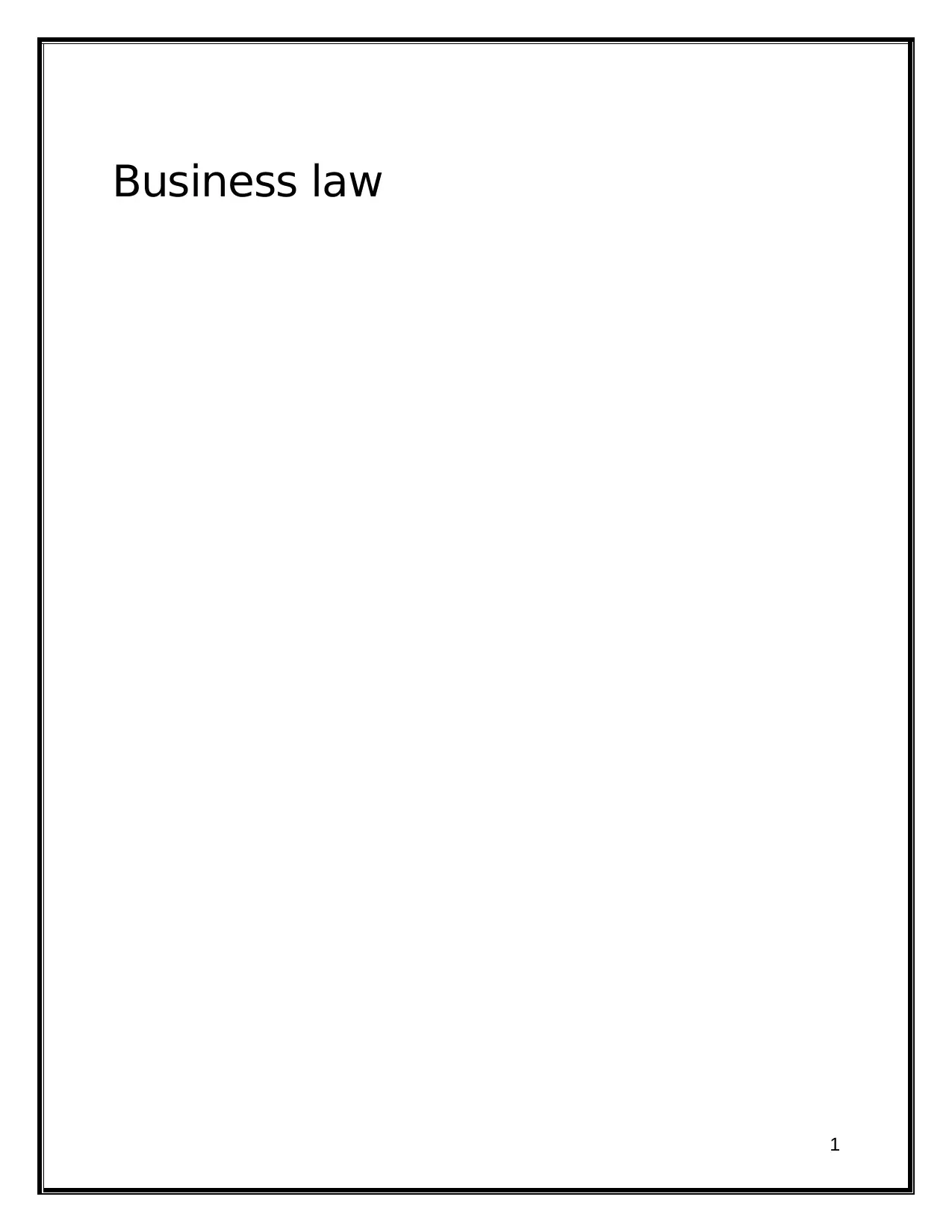
Business law
1
1
Paraphrase This Document
Need a fresh take? Get an instant paraphrase of this document with our AI Paraphraser
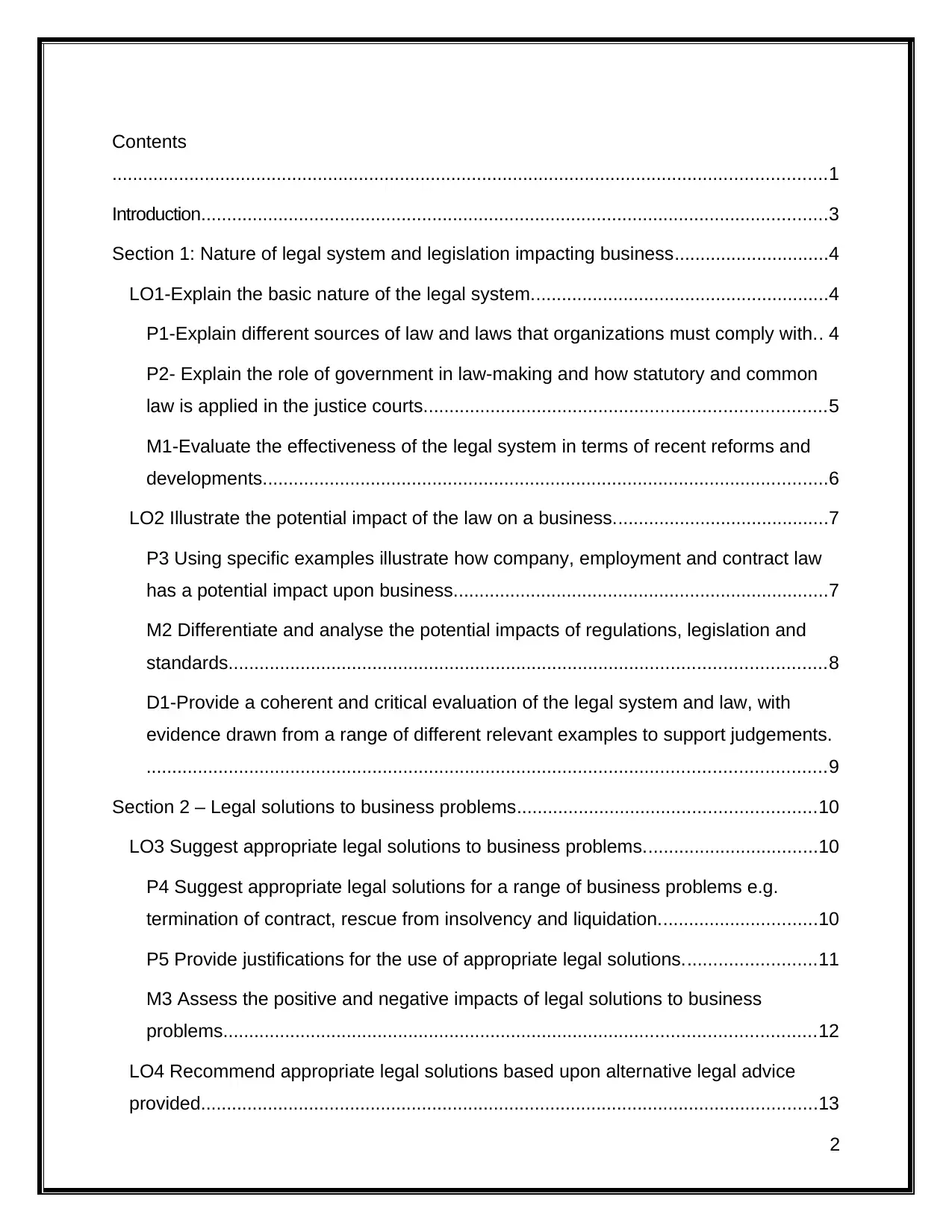
Contents
...........................................................................................................................................1
Introduction..........................................................................................................................3
Section 1: Nature of legal system and legislation impacting business..............................4
LO1-Explain the basic nature of the legal system..........................................................4
P1-Explain different sources of law and laws that organizations must comply with.. 4
P2- Explain the role of government in law-making and how statutory and common
law is applied in the justice courts..............................................................................5
M1-Evaluate the effectiveness of the legal system in terms of recent reforms and
developments..............................................................................................................6
LO2 Illustrate the potential impact of the law on a business..........................................7
P3 Using specific examples illustrate how company, employment and contract law
has a potential impact upon business.........................................................................7
M2 Differentiate and analyse the potential impacts of regulations, legislation and
standards....................................................................................................................8
D1-Provide a coherent and critical evaluation of the legal system and law, with
evidence drawn from a range of different relevant examples to support judgements.
....................................................................................................................................9
Section 2 – Legal solutions to business problems..........................................................10
LO3 Suggest appropriate legal solutions to business problems..................................10
P4 Suggest appropriate legal solutions for a range of business problems e.g.
termination of contract, rescue from insolvency and liquidation...............................10
P5 Provide justifications for the use of appropriate legal solutions..........................11
M3 Assess the positive and negative impacts of legal solutions to business
problems...................................................................................................................12
LO4 Recommend appropriate legal solutions based upon alternative legal advice
provided........................................................................................................................13
2
...........................................................................................................................................1
Introduction..........................................................................................................................3
Section 1: Nature of legal system and legislation impacting business..............................4
LO1-Explain the basic nature of the legal system..........................................................4
P1-Explain different sources of law and laws that organizations must comply with.. 4
P2- Explain the role of government in law-making and how statutory and common
law is applied in the justice courts..............................................................................5
M1-Evaluate the effectiveness of the legal system in terms of recent reforms and
developments..............................................................................................................6
LO2 Illustrate the potential impact of the law on a business..........................................7
P3 Using specific examples illustrate how company, employment and contract law
has a potential impact upon business.........................................................................7
M2 Differentiate and analyse the potential impacts of regulations, legislation and
standards....................................................................................................................8
D1-Provide a coherent and critical evaluation of the legal system and law, with
evidence drawn from a range of different relevant examples to support judgements.
....................................................................................................................................9
Section 2 – Legal solutions to business problems..........................................................10
LO3 Suggest appropriate legal solutions to business problems..................................10
P4 Suggest appropriate legal solutions for a range of business problems e.g.
termination of contract, rescue from insolvency and liquidation...............................10
P5 Provide justifications for the use of appropriate legal solutions..........................11
M3 Assess the positive and negative impacts of legal solutions to business
problems...................................................................................................................12
LO4 Recommend appropriate legal solutions based upon alternative legal advice
provided........................................................................................................................13
2
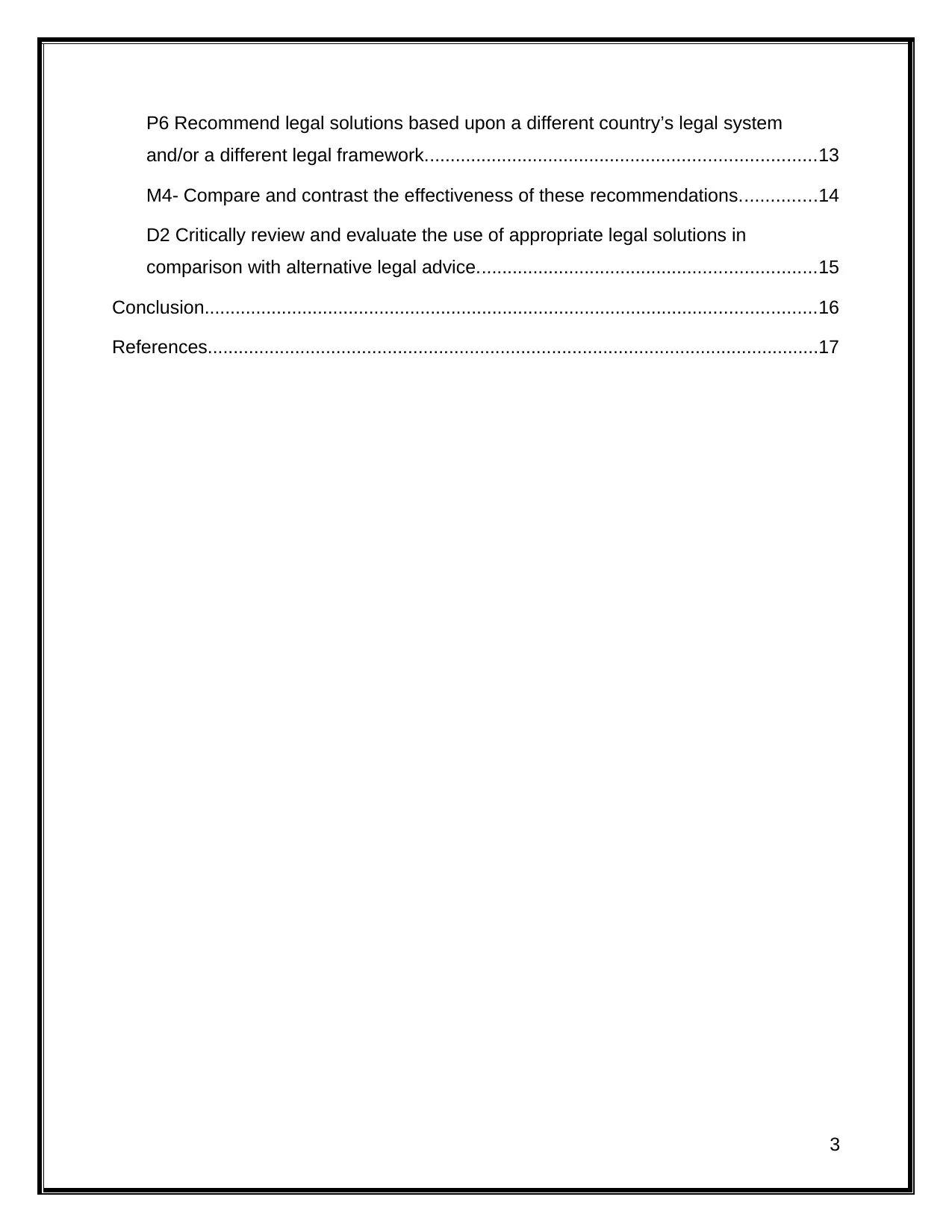
P6 Recommend legal solutions based upon a different country’s legal system
and/or a different legal framework............................................................................13
M4- Compare and contrast the effectiveness of these recommendations...............14
D2 Critically review and evaluate the use of appropriate legal solutions in
comparison with alternative legal advice..................................................................15
Conclusion.......................................................................................................................16
References.......................................................................................................................17
3
and/or a different legal framework............................................................................13
M4- Compare and contrast the effectiveness of these recommendations...............14
D2 Critically review and evaluate the use of appropriate legal solutions in
comparison with alternative legal advice..................................................................15
Conclusion.......................................................................................................................16
References.......................................................................................................................17
3
⊘ This is a preview!⊘
Do you want full access?
Subscribe today to unlock all pages.

Trusted by 1+ million students worldwide
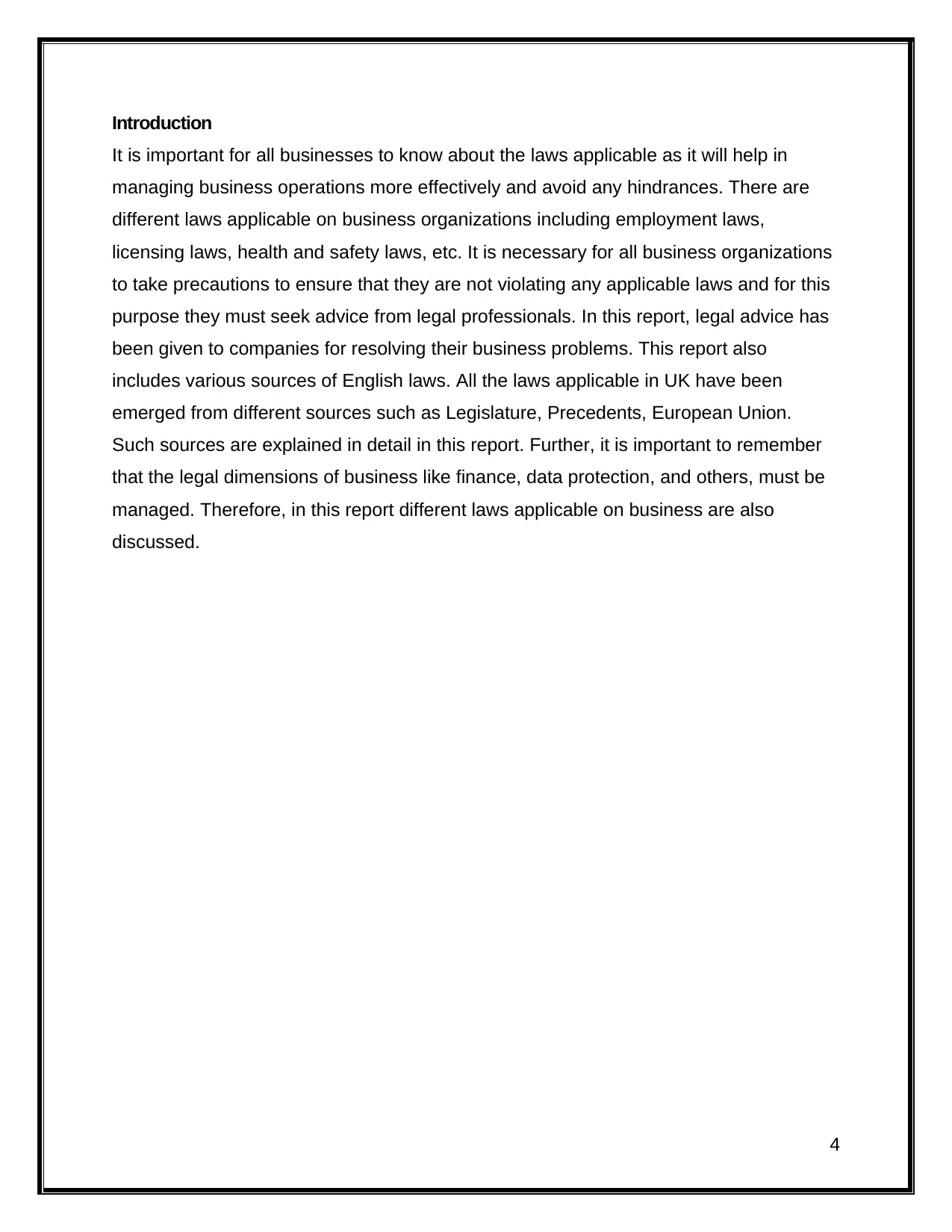
Introduction
It is important for all businesses to know about the laws applicable as it will help in
managing business operations more effectively and avoid any hindrances. There are
different laws applicable on business organizations including employment laws,
licensing laws, health and safety laws, etc. It is necessary for all business organizations
to take precautions to ensure that they are not violating any applicable laws and for this
purpose they must seek advice from legal professionals. In this report, legal advice has
been given to companies for resolving their business problems. This report also
includes various sources of English laws. All the laws applicable in UK have been
emerged from different sources such as Legislature, Precedents, European Union.
Such sources are explained in detail in this report. Further, it is important to remember
that the legal dimensions of business like finance, data protection, and others, must be
managed. Therefore, in this report different laws applicable on business are also
discussed.
4
It is important for all businesses to know about the laws applicable as it will help in
managing business operations more effectively and avoid any hindrances. There are
different laws applicable on business organizations including employment laws,
licensing laws, health and safety laws, etc. It is necessary for all business organizations
to take precautions to ensure that they are not violating any applicable laws and for this
purpose they must seek advice from legal professionals. In this report, legal advice has
been given to companies for resolving their business problems. This report also
includes various sources of English laws. All the laws applicable in UK have been
emerged from different sources such as Legislature, Precedents, European Union.
Such sources are explained in detail in this report. Further, it is important to remember
that the legal dimensions of business like finance, data protection, and others, must be
managed. Therefore, in this report different laws applicable on business are also
discussed.
4
Paraphrase This Document
Need a fresh take? Get an instant paraphrase of this document with our AI Paraphraser
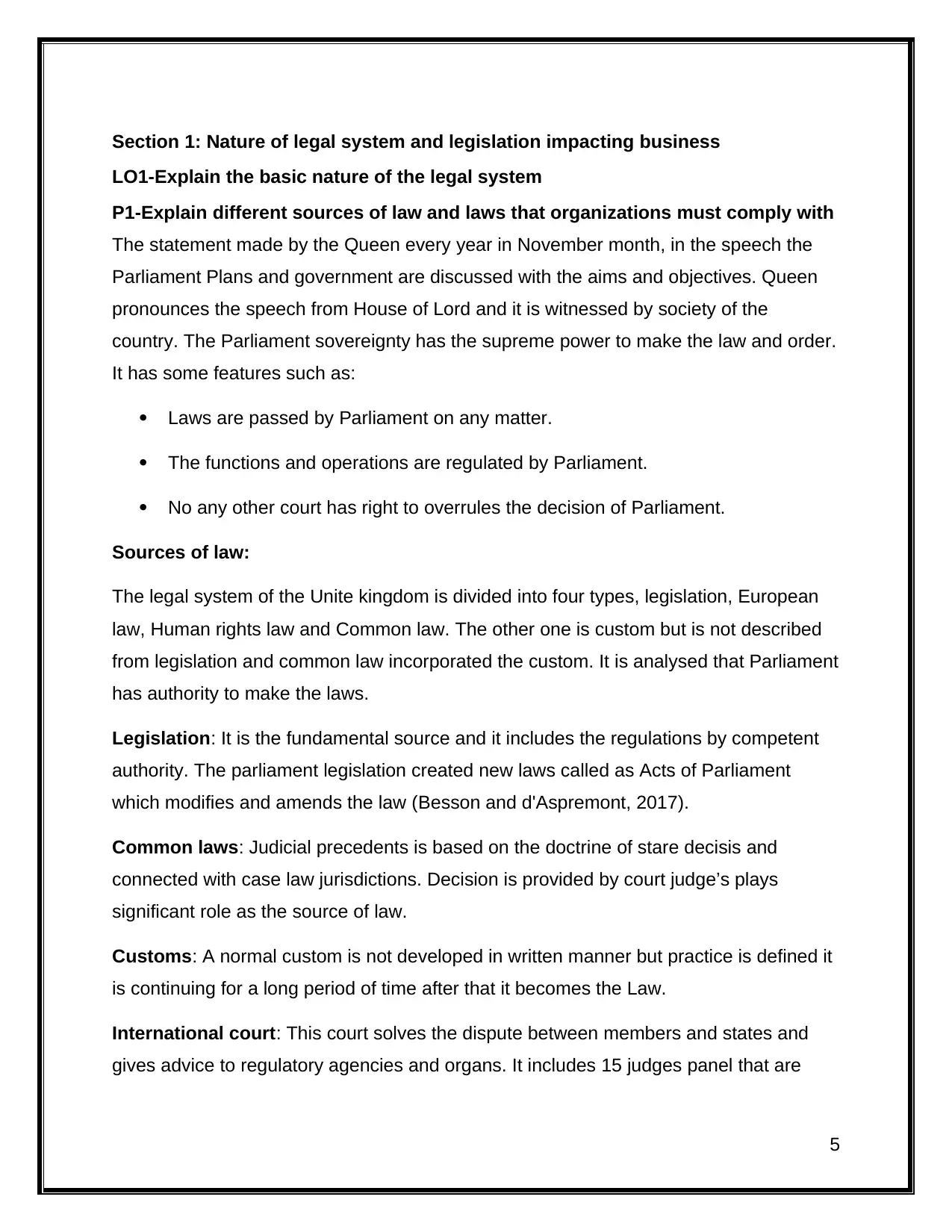
Section 1: Nature of legal system and legislation impacting business
LO1-Explain the basic nature of the legal system
P1-Explain different sources of law and laws that organizations must comply with
The statement made by the Queen every year in November month, in the speech the
Parliament Plans and government are discussed with the aims and objectives. Queen
pronounces the speech from House of Lord and it is witnessed by society of the
country. The Parliament sovereignty has the supreme power to make the law and order.
It has some features such as:
Laws are passed by Parliament on any matter.
The functions and operations are regulated by Parliament.
No any other court has right to overrules the decision of Parliament.
Sources of law:
The legal system of the Unite kingdom is divided into four types, legislation, European
law, Human rights law and Common law. The other one is custom but is not described
from legislation and common law incorporated the custom. It is analysed that Parliament
has authority to make the laws.
Legislation: It is the fundamental source and it includes the regulations by competent
authority. The parliament legislation created new laws called as Acts of Parliament
which modifies and amends the law (Besson and d'Aspremont, 2017).
Common laws: Judicial precedents is based on the doctrine of stare decisis and
connected with case law jurisdictions. Decision is provided by court judge’s plays
significant role as the source of law.
Customs: A normal custom is not developed in written manner but practice is defined it
is continuing for a long period of time after that it becomes the Law.
International court: This court solves the dispute between members and states and
gives advice to regulatory agencies and organs. It includes 15 judges panel that are
5
LO1-Explain the basic nature of the legal system
P1-Explain different sources of law and laws that organizations must comply with
The statement made by the Queen every year in November month, in the speech the
Parliament Plans and government are discussed with the aims and objectives. Queen
pronounces the speech from House of Lord and it is witnessed by society of the
country. The Parliament sovereignty has the supreme power to make the law and order.
It has some features such as:
Laws are passed by Parliament on any matter.
The functions and operations are regulated by Parliament.
No any other court has right to overrules the decision of Parliament.
Sources of law:
The legal system of the Unite kingdom is divided into four types, legislation, European
law, Human rights law and Common law. The other one is custom but is not described
from legislation and common law incorporated the custom. It is analysed that Parliament
has authority to make the laws.
Legislation: It is the fundamental source and it includes the regulations by competent
authority. The parliament legislation created new laws called as Acts of Parliament
which modifies and amends the law (Besson and d'Aspremont, 2017).
Common laws: Judicial precedents is based on the doctrine of stare decisis and
connected with case law jurisdictions. Decision is provided by court judge’s plays
significant role as the source of law.
Customs: A normal custom is not developed in written manner but practice is defined it
is continuing for a long period of time after that it becomes the Law.
International court: This court solves the dispute between members and states and
gives advice to regulatory agencies and organs. It includes 15 judges panel that are
5
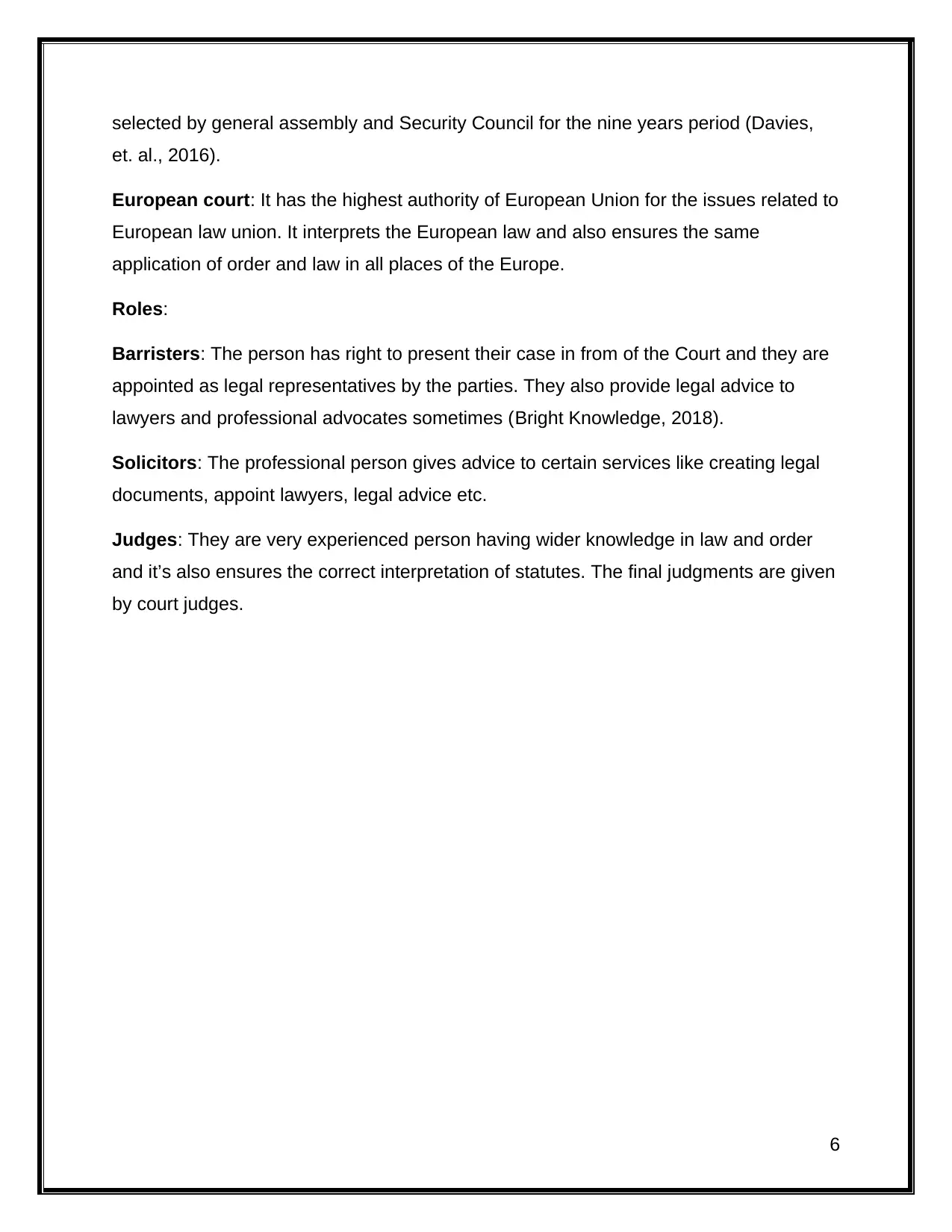
selected by general assembly and Security Council for the nine years period (Davies,
et. al., 2016).
European court: It has the highest authority of European Union for the issues related to
European law union. It interprets the European law and also ensures the same
application of order and law in all places of the Europe.
Roles:
Barristers: The person has right to present their case in from of the Court and they are
appointed as legal representatives by the parties. They also provide legal advice to
lawyers and professional advocates sometimes (Bright Knowledge, 2018).
Solicitors: The professional person gives advice to certain services like creating legal
documents, appoint lawyers, legal advice etc.
Judges: They are very experienced person having wider knowledge in law and order
and it’s also ensures the correct interpretation of statutes. The final judgments are given
by court judges.
6
et. al., 2016).
European court: It has the highest authority of European Union for the issues related to
European law union. It interprets the European law and also ensures the same
application of order and law in all places of the Europe.
Roles:
Barristers: The person has right to present their case in from of the Court and they are
appointed as legal representatives by the parties. They also provide legal advice to
lawyers and professional advocates sometimes (Bright Knowledge, 2018).
Solicitors: The professional person gives advice to certain services like creating legal
documents, appoint lawyers, legal advice etc.
Judges: They are very experienced person having wider knowledge in law and order
and it’s also ensures the correct interpretation of statutes. The final judgments are given
by court judges.
6
⊘ This is a preview!⊘
Do you want full access?
Subscribe today to unlock all pages.

Trusted by 1+ million students worldwide
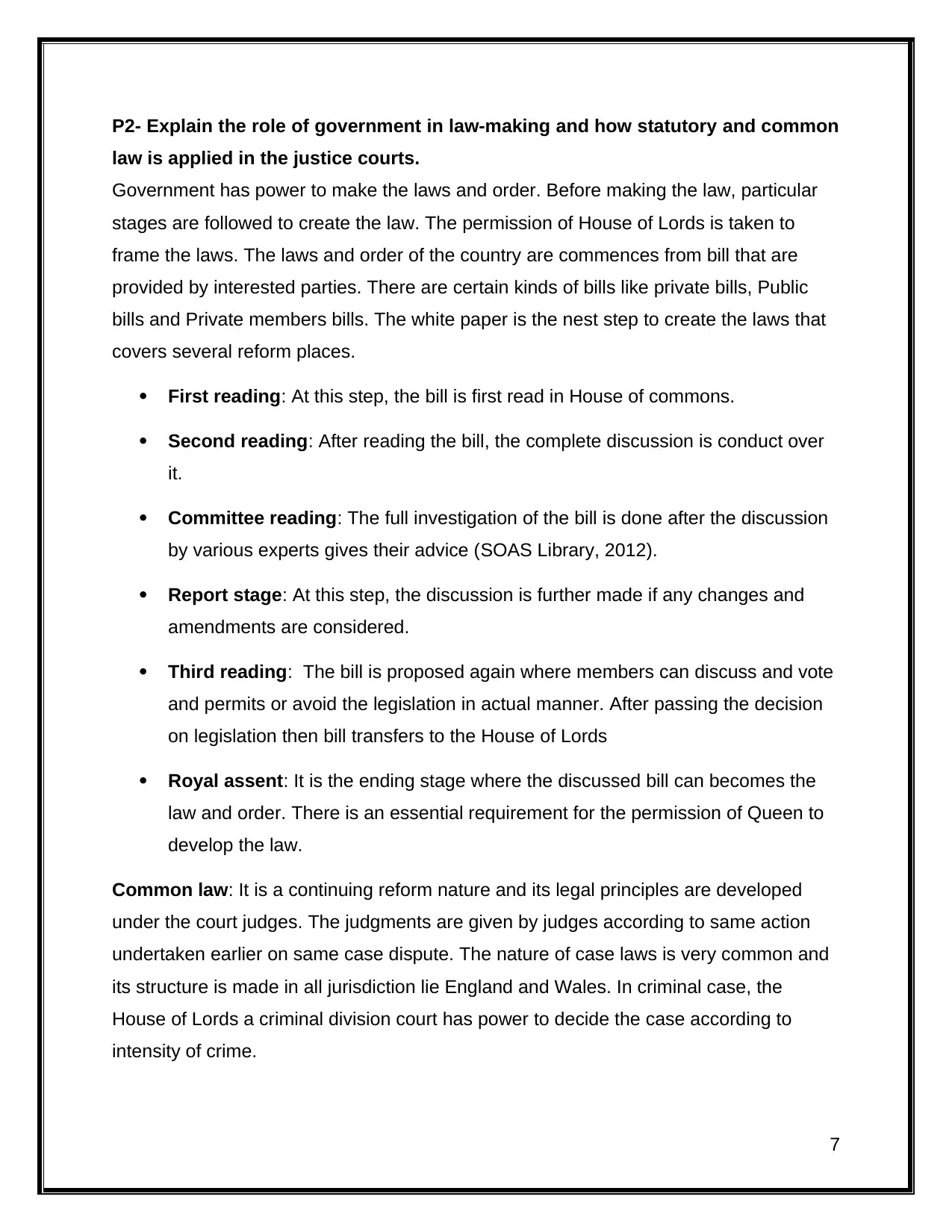
P2- Explain the role of government in law-making and how statutory and common
law is applied in the justice courts.
Government has power to make the laws and order. Before making the law, particular
stages are followed to create the law. The permission of House of Lords is taken to
frame the laws. The laws and order of the country are commences from bill that are
provided by interested parties. There are certain kinds of bills like private bills, Public
bills and Private members bills. The white paper is the nest step to create the laws that
covers several reform places.
First reading: At this step, the bill is first read in House of commons.
Second reading: After reading the bill, the complete discussion is conduct over
it.
Committee reading: The full investigation of the bill is done after the discussion
by various experts gives their advice (SOAS Library, 2012).
Report stage: At this step, the discussion is further made if any changes and
amendments are considered.
Third reading: The bill is proposed again where members can discuss and vote
and permits or avoid the legislation in actual manner. After passing the decision
on legislation then bill transfers to the House of Lords
Royal assent: It is the ending stage where the discussed bill can becomes the
law and order. There is an essential requirement for the permission of Queen to
develop the law.
Common law: It is a continuing reform nature and its legal principles are developed
under the court judges. The judgments are given by judges according to same action
undertaken earlier on same case dispute. The nature of case laws is very common and
its structure is made in all jurisdiction lie England and Wales. In criminal case, the
House of Lords a criminal division court has power to decide the case according to
intensity of crime.
7
law is applied in the justice courts.
Government has power to make the laws and order. Before making the law, particular
stages are followed to create the law. The permission of House of Lords is taken to
frame the laws. The laws and order of the country are commences from bill that are
provided by interested parties. There are certain kinds of bills like private bills, Public
bills and Private members bills. The white paper is the nest step to create the laws that
covers several reform places.
First reading: At this step, the bill is first read in House of commons.
Second reading: After reading the bill, the complete discussion is conduct over
it.
Committee reading: The full investigation of the bill is done after the discussion
by various experts gives their advice (SOAS Library, 2012).
Report stage: At this step, the discussion is further made if any changes and
amendments are considered.
Third reading: The bill is proposed again where members can discuss and vote
and permits or avoid the legislation in actual manner. After passing the decision
on legislation then bill transfers to the House of Lords
Royal assent: It is the ending stage where the discussed bill can becomes the
law and order. There is an essential requirement for the permission of Queen to
develop the law.
Common law: It is a continuing reform nature and its legal principles are developed
under the court judges. The judgments are given by judges according to same action
undertaken earlier on same case dispute. The nature of case laws is very common and
its structure is made in all jurisdiction lie England and Wales. In criminal case, the
House of Lords a criminal division court has power to decide the case according to
intensity of crime.
7
Paraphrase This Document
Need a fresh take? Get an instant paraphrase of this document with our AI Paraphraser
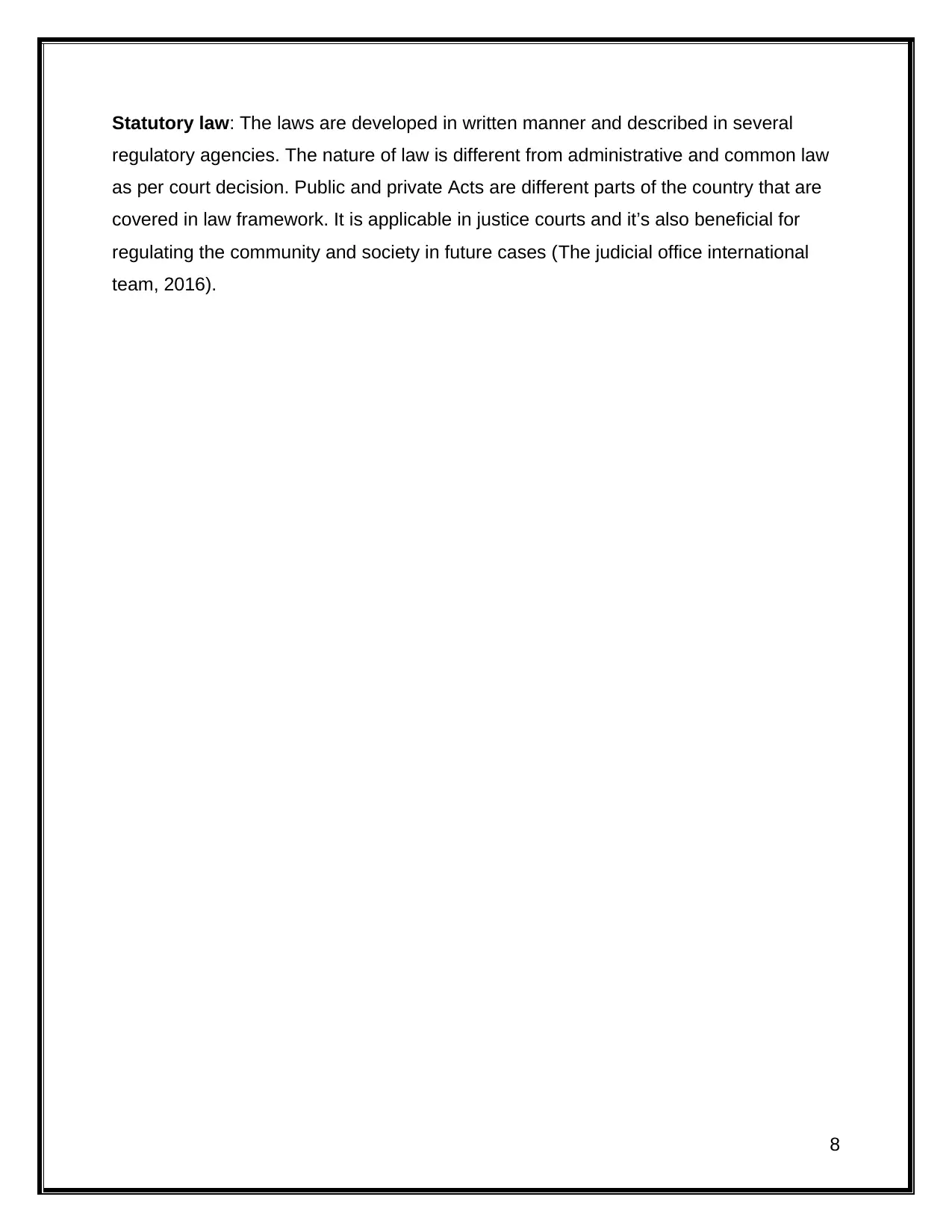
Statutory law: The laws are developed in written manner and described in several
regulatory agencies. The nature of law is different from administrative and common law
as per court decision. Public and private Acts are different parts of the country that are
covered in law framework. It is applicable in justice courts and it’s also beneficial for
regulating the community and society in future cases (The judicial office international
team, 2016).
8
regulatory agencies. The nature of law is different from administrative and common law
as per court decision. Public and private Acts are different parts of the country that are
covered in law framework. It is applicable in justice courts and it’s also beneficial for
regulating the community and society in future cases (The judicial office international
team, 2016).
8
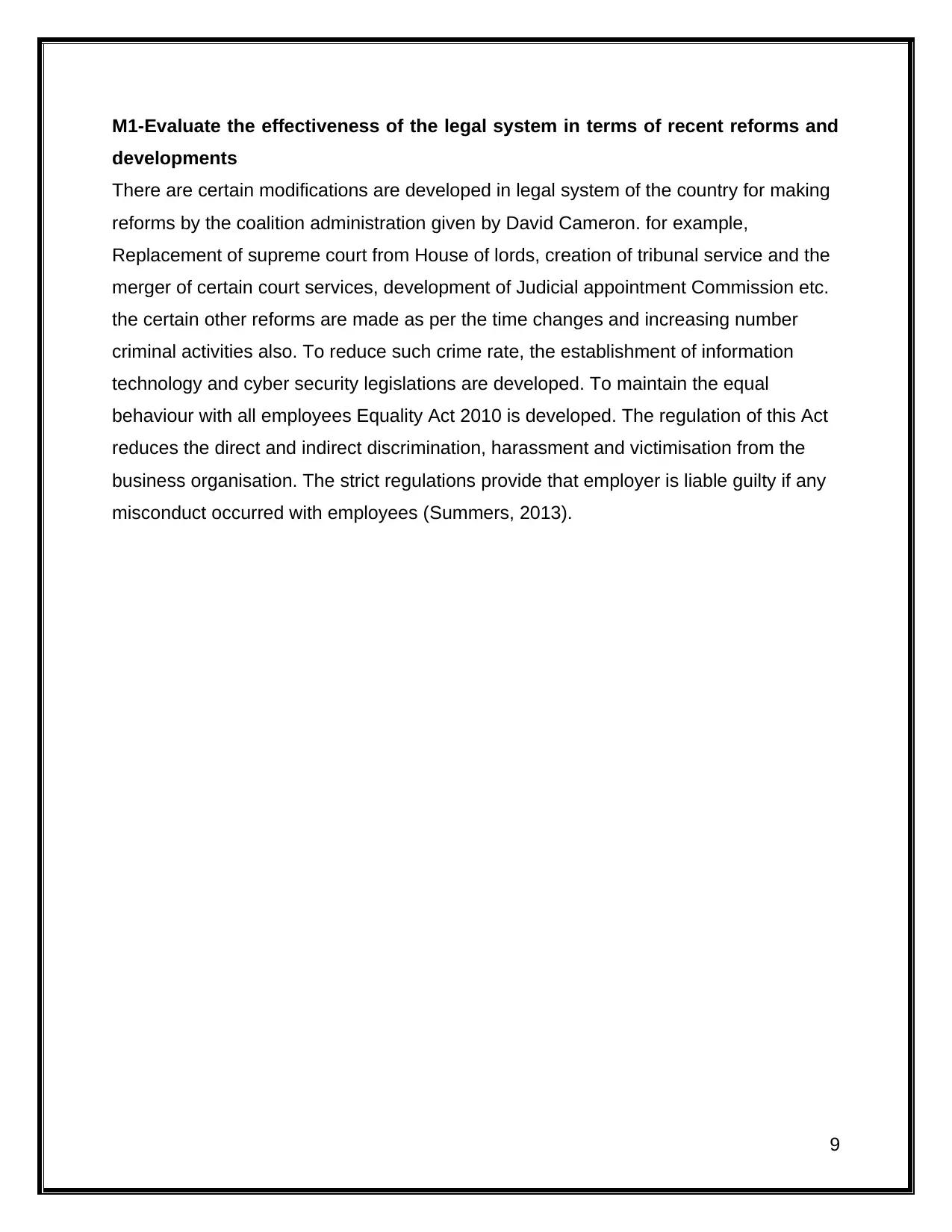
M1-Evaluate the effectiveness of the legal system in terms of recent reforms and
developments
There are certain modifications are developed in legal system of the country for making
reforms by the coalition administration given by David Cameron. for example,
Replacement of supreme court from House of lords, creation of tribunal service and the
merger of certain court services, development of Judicial appointment Commission etc.
the certain other reforms are made as per the time changes and increasing number
criminal activities also. To reduce such crime rate, the establishment of information
technology and cyber security legislations are developed. To maintain the equal
behaviour with all employees Equality Act 2010 is developed. The regulation of this Act
reduces the direct and indirect discrimination, harassment and victimisation from the
business organisation. The strict regulations provide that employer is liable guilty if any
misconduct occurred with employees (Summers, 2013).
9
developments
There are certain modifications are developed in legal system of the country for making
reforms by the coalition administration given by David Cameron. for example,
Replacement of supreme court from House of lords, creation of tribunal service and the
merger of certain court services, development of Judicial appointment Commission etc.
the certain other reforms are made as per the time changes and increasing number
criminal activities also. To reduce such crime rate, the establishment of information
technology and cyber security legislations are developed. To maintain the equal
behaviour with all employees Equality Act 2010 is developed. The regulation of this Act
reduces the direct and indirect discrimination, harassment and victimisation from the
business organisation. The strict regulations provide that employer is liable guilty if any
misconduct occurred with employees (Summers, 2013).
9
⊘ This is a preview!⊘
Do you want full access?
Subscribe today to unlock all pages.

Trusted by 1+ million students worldwide
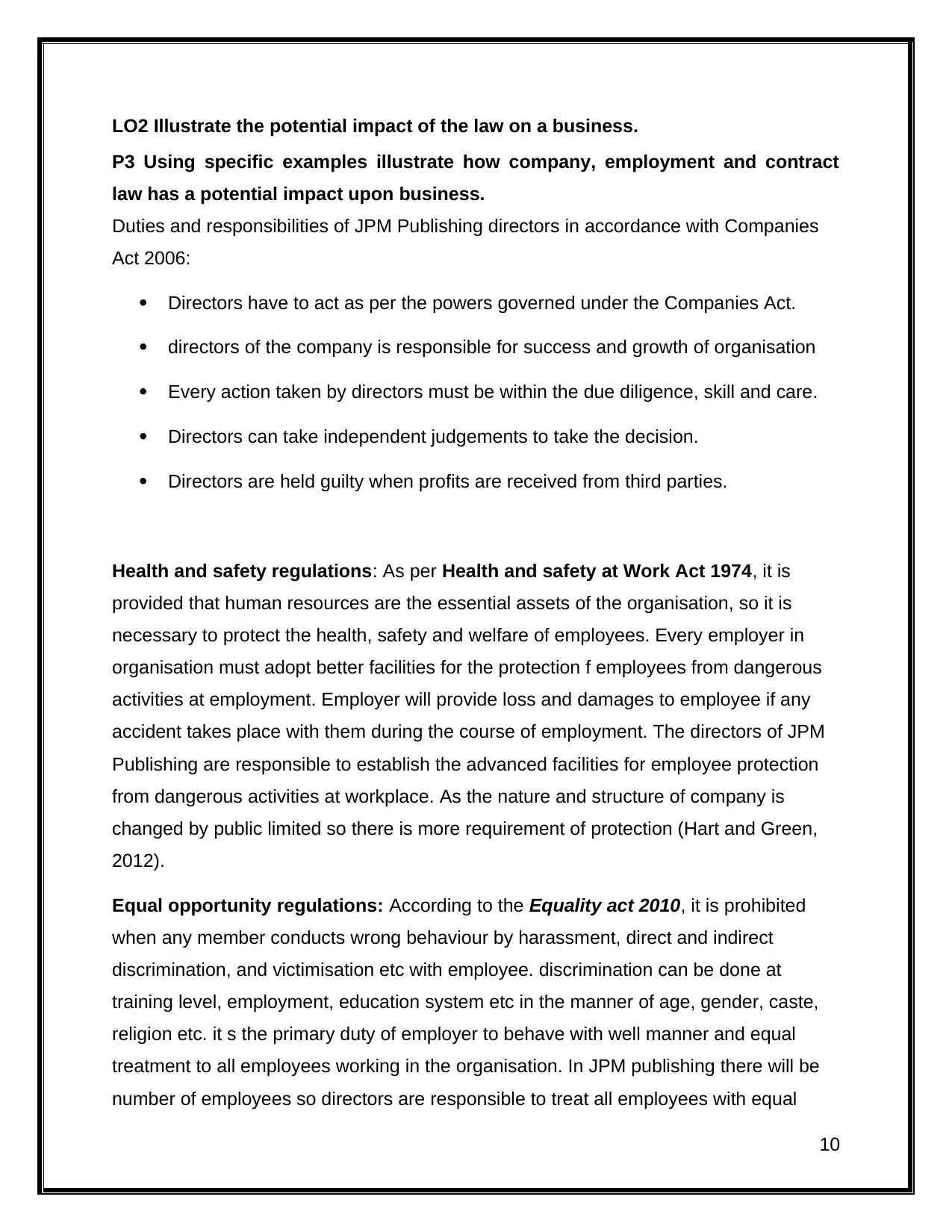
LO2 Illustrate the potential impact of the law on a business.
P3 Using specific examples illustrate how company, employment and contract
law has a potential impact upon business.
Duties and responsibilities of JPM Publishing directors in accordance with Companies
Act 2006:
Directors have to act as per the powers governed under the Companies Act.
directors of the company is responsible for success and growth of organisation
Every action taken by directors must be within the due diligence, skill and care.
Directors can take independent judgements to take the decision.
Directors are held guilty when profits are received from third parties.
Health and safety regulations: As per Health and safety at Work Act 1974, it is
provided that human resources are the essential assets of the organisation, so it is
necessary to protect the health, safety and welfare of employees. Every employer in
organisation must adopt better facilities for the protection f employees from dangerous
activities at employment. Employer will provide loss and damages to employee if any
accident takes place with them during the course of employment. The directors of JPM
Publishing are responsible to establish the advanced facilities for employee protection
from dangerous activities at workplace. As the nature and structure of company is
changed by public limited so there is more requirement of protection (Hart and Green,
2012).
Equal opportunity regulations: According to the Equality act 2010, it is prohibited
when any member conducts wrong behaviour by harassment, direct and indirect
discrimination, and victimisation etc with employee. discrimination can be done at
training level, employment, education system etc in the manner of age, gender, caste,
religion etc. it s the primary duty of employer to behave with well manner and equal
treatment to all employees working in the organisation. In JPM publishing there will be
number of employees so directors are responsible to treat all employees with equal
10
P3 Using specific examples illustrate how company, employment and contract
law has a potential impact upon business.
Duties and responsibilities of JPM Publishing directors in accordance with Companies
Act 2006:
Directors have to act as per the powers governed under the Companies Act.
directors of the company is responsible for success and growth of organisation
Every action taken by directors must be within the due diligence, skill and care.
Directors can take independent judgements to take the decision.
Directors are held guilty when profits are received from third parties.
Health and safety regulations: As per Health and safety at Work Act 1974, it is
provided that human resources are the essential assets of the organisation, so it is
necessary to protect the health, safety and welfare of employees. Every employer in
organisation must adopt better facilities for the protection f employees from dangerous
activities at employment. Employer will provide loss and damages to employee if any
accident takes place with them during the course of employment. The directors of JPM
Publishing are responsible to establish the advanced facilities for employee protection
from dangerous activities at workplace. As the nature and structure of company is
changed by public limited so there is more requirement of protection (Hart and Green,
2012).
Equal opportunity regulations: According to the Equality act 2010, it is prohibited
when any member conducts wrong behaviour by harassment, direct and indirect
discrimination, and victimisation etc with employee. discrimination can be done at
training level, employment, education system etc in the manner of age, gender, caste,
religion etc. it s the primary duty of employer to behave with well manner and equal
treatment to all employees working in the organisation. In JPM publishing there will be
number of employees so directors are responsible to treat all employees with equal
10
Paraphrase This Document
Need a fresh take? Get an instant paraphrase of this document with our AI Paraphraser
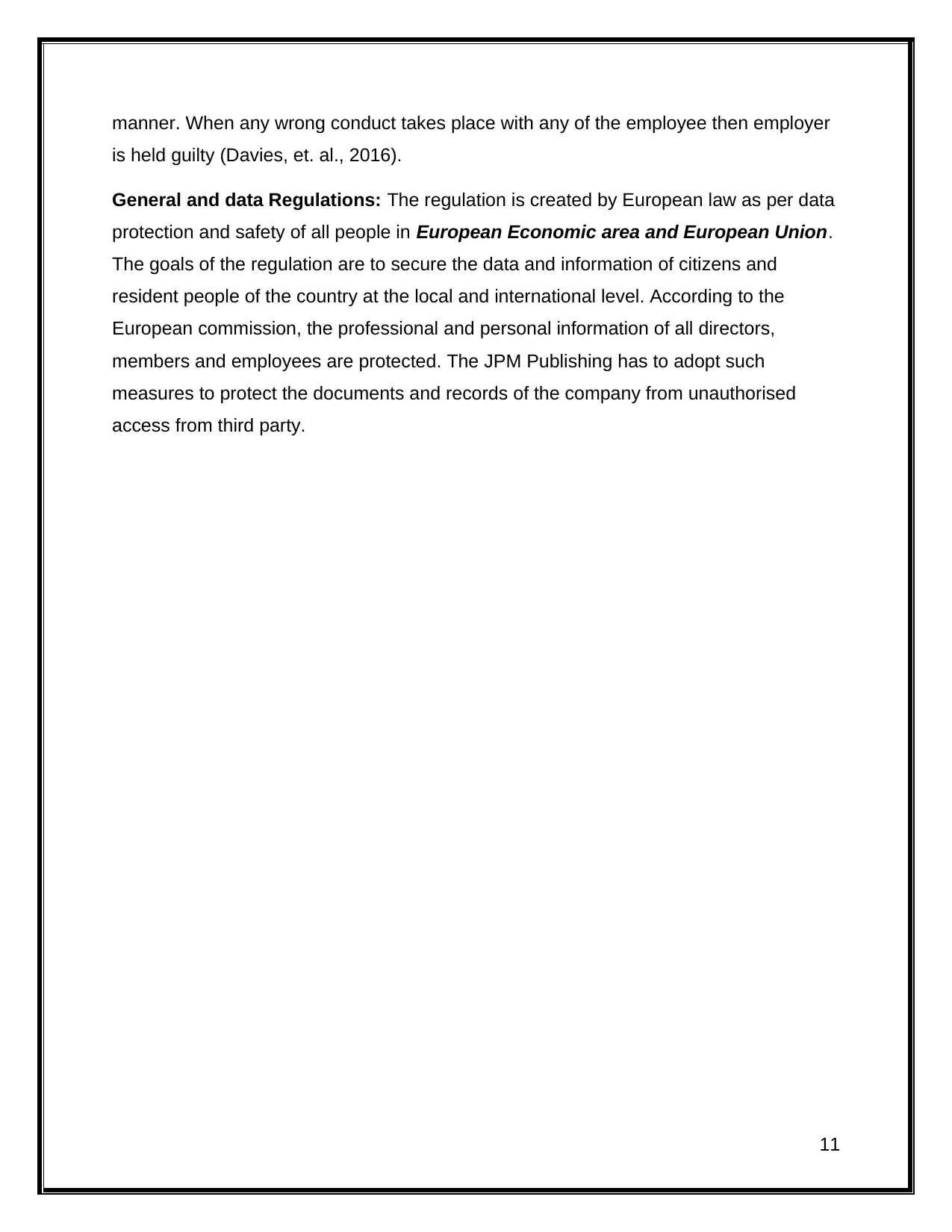
manner. When any wrong conduct takes place with any of the employee then employer
is held guilty (Davies, et. al., 2016).
General and data Regulations: The regulation is created by European law as per data
protection and safety of all people in European Economic area and European Union.
The goals of the regulation are to secure the data and information of citizens and
resident people of the country at the local and international level. According to the
European commission, the professional and personal information of all directors,
members and employees are protected. The JPM Publishing has to adopt such
measures to protect the documents and records of the company from unauthorised
access from third party.
11
is held guilty (Davies, et. al., 2016).
General and data Regulations: The regulation is created by European law as per data
protection and safety of all people in European Economic area and European Union.
The goals of the regulation are to secure the data and information of citizens and
resident people of the country at the local and international level. According to the
European commission, the professional and personal information of all directors,
members and employees are protected. The JPM Publishing has to adopt such
measures to protect the documents and records of the company from unauthorised
access from third party.
11
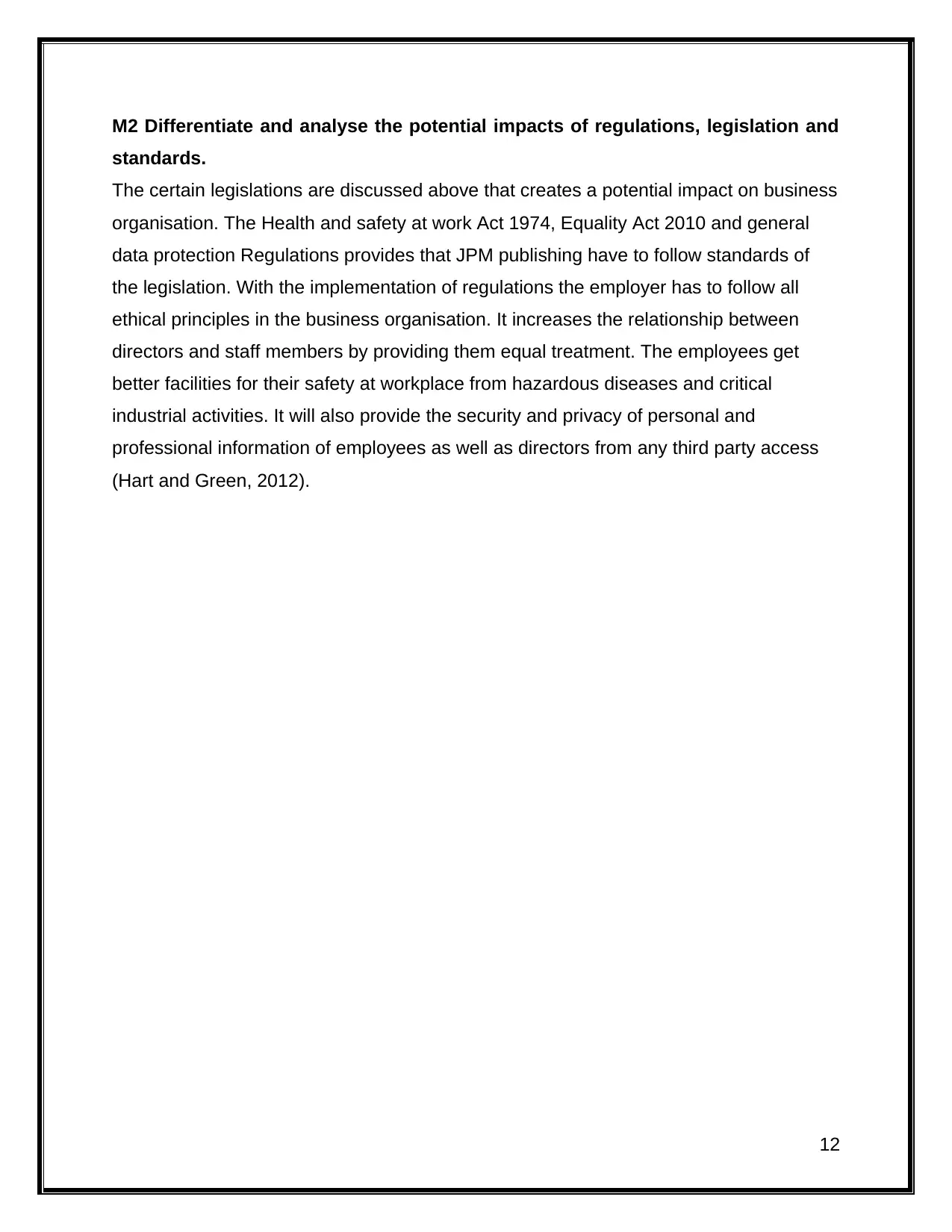
M2 Differentiate and analyse the potential impacts of regulations, legislation and
standards.
The certain legislations are discussed above that creates a potential impact on business
organisation. The Health and safety at work Act 1974, Equality Act 2010 and general
data protection Regulations provides that JPM publishing have to follow standards of
the legislation. With the implementation of regulations the employer has to follow all
ethical principles in the business organisation. It increases the relationship between
directors and staff members by providing them equal treatment. The employees get
better facilities for their safety at workplace from hazardous diseases and critical
industrial activities. It will also provide the security and privacy of personal and
professional information of employees as well as directors from any third party access
(Hart and Green, 2012).
12
standards.
The certain legislations are discussed above that creates a potential impact on business
organisation. The Health and safety at work Act 1974, Equality Act 2010 and general
data protection Regulations provides that JPM publishing have to follow standards of
the legislation. With the implementation of regulations the employer has to follow all
ethical principles in the business organisation. It increases the relationship between
directors and staff members by providing them equal treatment. The employees get
better facilities for their safety at workplace from hazardous diseases and critical
industrial activities. It will also provide the security and privacy of personal and
professional information of employees as well as directors from any third party access
(Hart and Green, 2012).
12
⊘ This is a preview!⊘
Do you want full access?
Subscribe today to unlock all pages.

Trusted by 1+ million students worldwide
1 out of 25
Related Documents
Your All-in-One AI-Powered Toolkit for Academic Success.
+13062052269
info@desklib.com
Available 24*7 on WhatsApp / Email
![[object Object]](/_next/static/media/star-bottom.7253800d.svg)
Unlock your academic potential
Copyright © 2020–2025 A2Z Services. All Rights Reserved. Developed and managed by ZUCOL.





